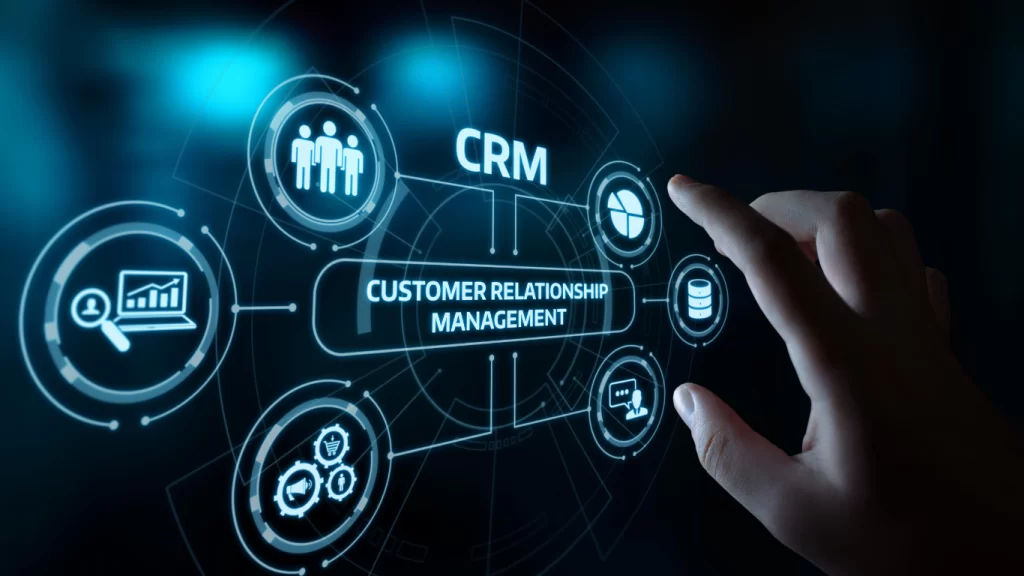
Sixty two percent of consumers are willing to share negative experiences they’ve had with your brand, making a strong customer relations strategy not just important but necessary.
CRM refers to both the process and technology companies use to manage external interactions with customers. Let IES show you how CRM tools can simplify daily work tasks, enhance audience data organization and support internal departments such as Sales, Marketing and Customer Service.
Customer Relationship Management (CRM) Software
An effective CRM system enables you to keep tabs on leads and customers while automating some sales and marketing processes, providing insights to help your team increase revenue growth while increasing customer satisfaction.
CRM software can replace the patchwork of spreadsheets, databases and apps many businesses rely on to manage client information. It streamlines communication efforts (form fills, calls, emails, texts and meetings), documents, quotes purchases service conversations and tasks into an accessible central system that’s easily accessible by all team members.
Some CRMs are tailored specifically to collaboration, providing teams with better information and easier ways to collaborate even when working remotely. They also support secure and audited sharing that adheres to your company’s privacy and security policies. You can purchase one in various ways ranging from flat rate pricing plans with tiered modules and usage fees, to tiered options that feature additional modules based on usage fees – whatever system you decide upon should meet the needs of your team!
Customer Relationship Management (CRM) Platforms
CRM platforms serve as a central data repository for all of your customer information, enabling you to automate business processes to streamline sales, marketing and customer service activities. Some platforms even offer features like omnichannel communication, sales forecasting and conversion attribution that help streamline those activities further.
CRM systems that integrate with other software tools help your team keep an eye on customer details while improving interdepartmental collaboration. Search for systems with robust integration capabilities that can be tailored specifically to meet the needs of your company.
Bundling CRM tools into one platform helps keep costs low and centralize customer information, such as Keap’s affordable CRM solution that includes marketing automation and customer support tools to amplify small businesses without needing extensive in-house tech expertise. As it uses low-code, it makes tweaks and implementation changes effortless without taking the system offline – its intuitive dashboard allowing users to quickly identify insights that support growth decisions made with data at hand.
Customer Relationship Management Software (CRM) for Sales
CRM (Customer Relationship Management) software provides teams with an organized repository for customer data and helps manage lead and customer interactions more efficiently, providing more individualized service while improving overall communication and collaboration.
Salespeople can leverage CRM information to identify upselling and cross-selling opportunities, create more tailored communications with customers, and convert more rapidly. It also helps them manage workload more effectively while prioritising leads.
An effective CRM system should be straightforward to navigate and mobile-accessible so team members can access vital customer data on the go. A visual sales pipeline provides quick overviews, with intuitive drag-and-drop responses for mission-critical tasks highlighted on a dashboard. In addition, flexible workflow automation tools should be present as well as native messaging inbox that stores interaction history automatically. Many CRM providers provide free trials so users can test out its capabilities before investing in paid subscription.
Customer Relationship Management Software (CRM) for Marketing
CRMs designed specifically to assist marketing are tailored to help companies manage leads, convert them to customers, provide outstanding customer service to those customers and gain insights into sales trends and marketing effectiveness.
These CRM systems store all of a company’s leads and customers in one centralized database, giving business owners a comprehensive view of each client, which helps identify their needs, introduce upselling/cross-selling strategies, and initiate client retention programs.
When selecting a CRM system for marketing, look for one with integrations with existing MarTech tools to ensure data can easily move back and forth between platforms. Also take into account cost, service quality and functionality – some vendors offer multiple products under their brand name so deciding between these can often come down to personal choice.






